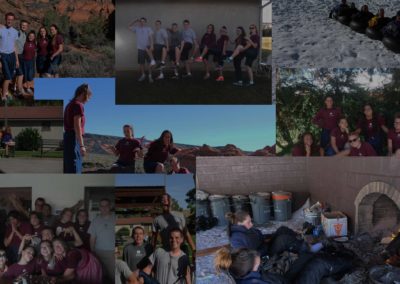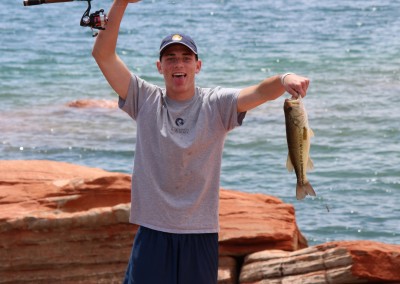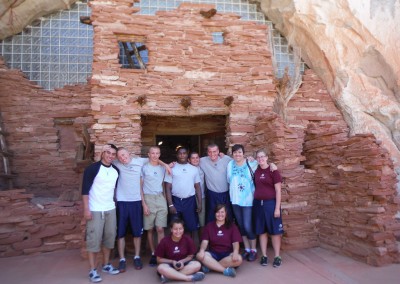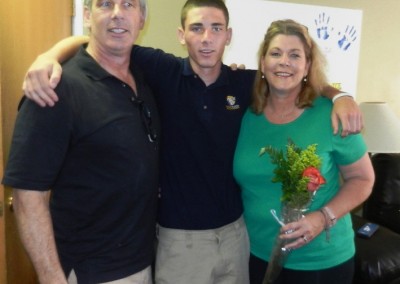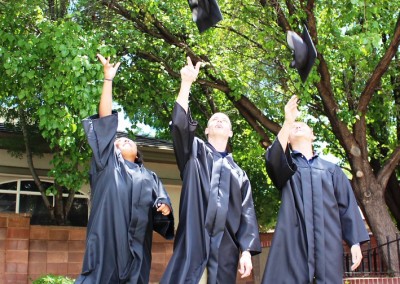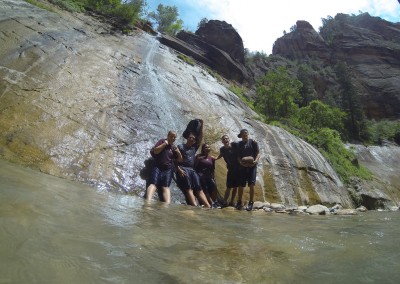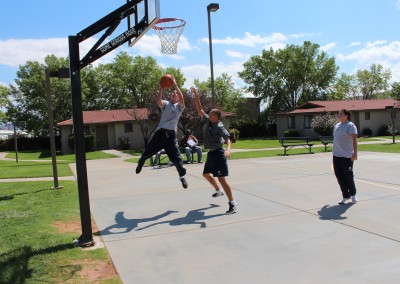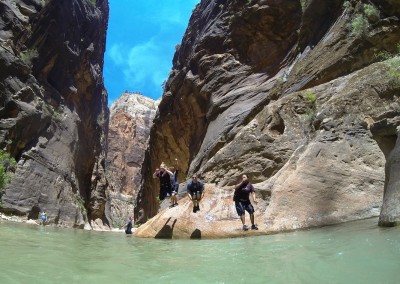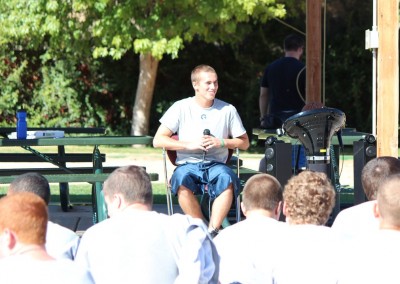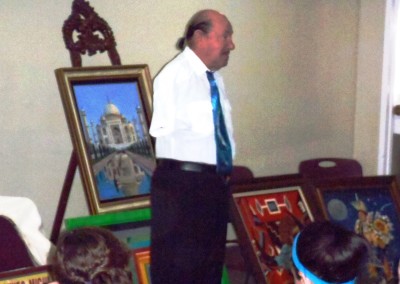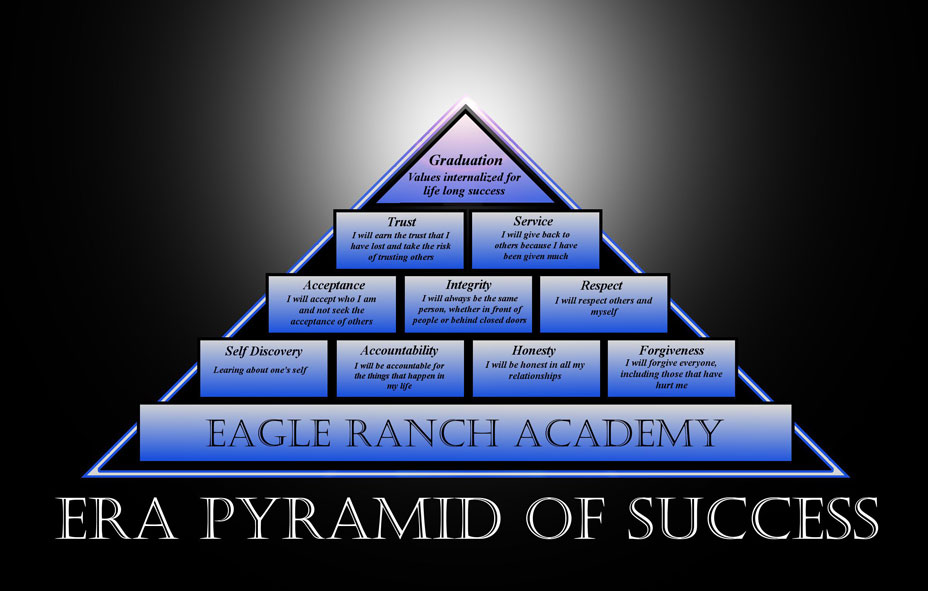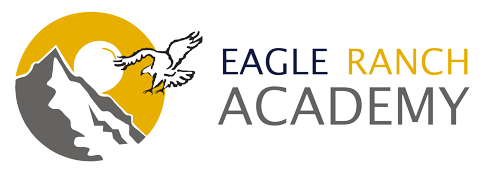A Choice Based Program
This page will explain who we are, and a little about our program. Eagle Ranch Academy is located in St. George, UT. We are licensed through the State of Utah, Department of Human Services, Office of Licensing, as a Residential Treatment Center (RTC) for boys and girls ages 12 through 17. We are CARF Accredited.
We teach and emphasize eight basic core values through group therapy, individual and family therapy, books, written assignments, oral presentations, service projects, etc. Those core values include:
Accountability, Honesty, Forgiveness, Acceptance, Integrity, Respect, Trust, and Service.
Henry Learns About Accountability!

Upon Arrival!
1. We offer a comprehensive therapeutic program for our students. Some of the main treatment modalities include CBT, DBT, Experiential, and a Certified Equine Assisted Psychotherapy Program.
2. Individual therapy as often as needed, 1-3 times per week. Formal and informal.
3. Group therapy: 2-3 times daily, where a variety of issues are discussed including goal setting, family relationships, team building, leadership, life skills, etc.
4. Psychiatrist on campus once a week:Evaluations during the initial 20 days includes: psychiatrist evaluation, academic assessment, medical/physical evaluation, and drug testing.
5. Medical Doctor on campus once a week and on call 24/7. Full time nurse on campus weekdays and on call 24/7.
6. Two medical hospitals and two medical Insta-Care facilities within 8 miles of campus.
7. Drug or Addiction Rehabilitation using the 12 Step Program. Attend weekly AA/NA meetings on and off campus if appropriate.
8. Weekly Issues Groups which include: Grief Issues, Adoptive Issues, Anger Management, Self Esteem, AA/NA, Seeking Safety, DBT, etc.
9. We also have a very strong academic component. Our academic program is nationally accredited, and the students have the opportunity to catch up or get ahead academically. We provide the opportunity for students to earn their HS diploma, take the SAT or ACT, earn their GED, and/or earn college credits. Class credits are fully transferable.
10. Academic classes include online courses as well as on campus classes taught by certified teachers. One-on-one tutoring is provided to students who needs or wants additional help.
11. We provide Emotional Growth Seminars for students, parents, and siblings.
Giving Back
We also reconnect families and teach students how to deal with their relationships. By helping your child choose to internalize important core values and learn how to live them, your child will take responsibility and control for the choices they make and how they deal with issues today, tomorrow and in the future. Please, call us at 888-698-7095 for a free no obligation consultation. One of our Counselor’s will answer your questions, help you learn more about different types of youth programs, what Eagle Ranch Academy has to offer, and what may be the best solution to the issues facing your child, your family and you!
Sincerely,
Paul Arslanian
Executive Director
Eagle Ranch Academy Fact Sheet.
General
- 48 – 52 students, coed, ages 12 through 17.
- Students are organized into 3 different Groups referred to as “Pods” or “Family Group 1, 2, or 3.”
- Each group comprised of 12 – 16 students, including both males and females. (Living/sleeping
- accommodations are completely separate gender only facilities.)
- Licensed and monitored through State of Utah as a Residential Treatment Center.
- Choice Based Program focusing on core values and relationships utilizing our Value Based Behavior
- Change Model. This distinguishes us from all the “Behavior Modification” programs.
Safety & Security
- Secure 24/7 facility.
- Daytime the staff to student ratio is 1/4. Nighttime the staff to student ratio is 1/6. Night staff remains awake all night and check
- bedrooms every 20 minutes.
- 1 student allowed in bathroom at a time. Change clothes in bathroom.
- Completely separate gender only facilities.
- Entire campus, including classrooms, hallways, kitchen, cafeteria, living rooms, and the outside is monitored by security cameras (excluding bedrooms and bathrooms). This protects both students and staff.
Therapy/Treatment/Medical
- 5 full time Master Level Therapists embedded with students 40-50 hours per week.
- Individual therapy as often as needed. 1-3 times per week. Formal and informal.
- Family Therapy 1 time per week by telephone or by internet voice and video calls (Skype).
- Group therapy 2-3 times daily with a Therapist — (includes Cognitive or Dialectical Behavioral
- (DBT), Sexual Abuse/Issues, Grief, Gender Specific, Equine, Anger Management, etc.)
- 1-2 times a week substance and drug abuse treatment with a Therapist.
- Once a week gender only group class with a Therapist.
- Psychiatrist on campus every Tuesday.
- Extensive evaluations during initial 20 days after enrollment includes:
– Psychiatrist evaluations;
– Academic Assessment;
– Medical/Physical evaluation;
– Drug test. - Medical Doctor on campus every Thursday and on call 24/7.
- Full time nurse (RN or LPN) on campus every weekday and on call 24/7.
- One regional medical center and two Insta-Care facilities within 8 miles of campus.
- Drug or Addiction Rehabilitation.
– 12 step program. Attend AA/NA meetings on and off campus, staff and therapists participation. - Every morning each student does goal setting and every night they have group core value discussions.
- Additional classes, groups, and seminars will be incorporated throughout our Program.
Family Involvement
- Family involvement is critical and includes:
– Weekly family therapy by telephone or internet voice and video calls (Skype).
– Weekly progress reports via call with Therapist and through individual online Parent Page.
– Parents/family attends 2 emotional growth seminars. Same seminars the students attend. Geared around the 1st and 2nd visit with the student.
– Family visits include: on campus, off campus, overnight hotel visits, 2 monitored home
visits prior to graduation. Parent and Therapist determine visits.
– After self-discovery phase (usually 2-6 weeks), parents have 2 telephone or internet voice
and video calls (Skype) per week with child.
– Write and receive postcards immediately after enrollment, as often as they choose.
– 2 day family workshop prior to graduation.
– Upon graduation from the program a student is prepared to return home.
Academics
- Academic Program is both nationally and internationally accredited. An academic plan is designed specifically for each student.
– Classes of 12-16 students.
– An online component and also an on campus component.
– Certified, licensed educators.
– Student’s progress at their own pace.
– An accelerated pace is possible. Each student could get caught up or be ahead of schedule with their schooling. Students can earn HS diploma, GED. Online college credits are possible.
– Credits are fully transferrable and show on transcript as college prep courses.
– SAT/ACT test preparation and administration available.
– Assistance with applications for college and scholarships.
– Career counseling and job services available.
Family Involvement
- Family involvement is critical and includes:
– Weekly family therapy by telephone or internet voice and video calls (Skype).
– Weekly progress reports via call with Therapist and through individual online Parent Page.
– Parents/family attends 2 emotional growth seminars. Same seminars the students attend. Geared around the 1st and 2nd visit with the student.
– Family visits include: on campus, off campus, overnight hotel visits, 2 monitored home
visits prior to graduation. Parent and Therapist determine visits.
– After self-discovery phase (usually 2-6 weeks), parents have 2 telephone or internet voice
and video calls (Skype) per week with child.
– Write and receive postcards immediately after enrollment, as often as they choose.
– 2 day family workshop prior to graduation.
– Upon graduation from the program a student is prepared to return home.
Aftercare
- Strong Aftercare Program includes:
– Aftercare Coordinator helps set up support system prior to transition back home.
– Phone calls to student and parents weekly during initial 30 days home, then bi-weekly.
– Aftercare Coordinator phone calls with both student and family as long as needed (years not just weeks).
– Develop and implement a strong transition plan that works best for student. This can include, but not limited to: return home, boarding school.
Healthy Living/Nutrition
- Daily work-outs on campus. Off campus, full service fitness center 2 times per week.
- Nutritionist plans and prepares meals; students take turns helping in kitchen.
- Off campus activities include service projects and recreational outings 2+ times per month.
